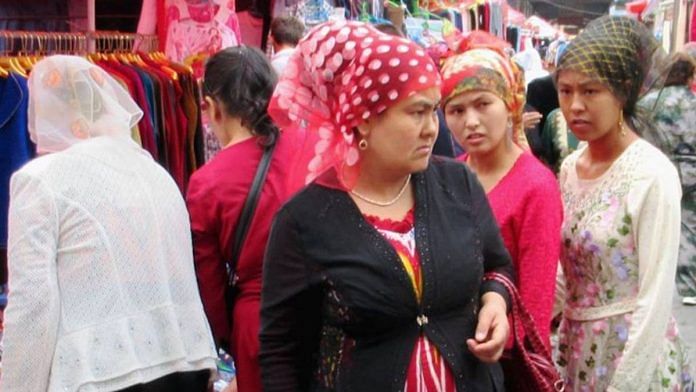New Delhi: A Chinese regional governing body-cum-commercial behemoth linked to the mass detention of Uyghurs in Xinjiang continues to profit from and have access to international markets, according to a report by US-based research organisation Center for Advanced Defense Studies (C4ADS).
The report, released Tuesday, focuses on the Xinjiang Production and Construction Corps (XPCC), a state-owned economic and paramilitary organisation founded in 1954, five years after the Communist Party took power in China.
The XPCC was sanctioned by the US in July 2020 and the European Union (EU) in March this year for alleged human rights abuses. While the EU took action against the XPCC’s Public Security Bureau in particular for its administration of detention centers, the US noted that the entity is being sanctioned for its “connection to serious human rights abuse against ethnic minorities in Xinjiang, which reportedly include mass arbitrary detention and severe physical abuse, among other serious abuses targeting Uyghurs, a Turkic Muslim population indigenous to Xinjiang, and other ethnic minorities in the region”.
According to the C4ADS report, the “analysis of publicly available information reveals that sanctions and international outrage have been insufficient in preventing the XPCC from accessing global markets, allowing it to continue profiting from forced labour and other forms of oppression”.
Titled ‘Long Shadows: How the Global Economy Supports Oppression in Xinjiang‘, the report also notes that it is difficult to remove a firm such as XPCC from the global economy as it is deeply enmeshed. It therefore urges stakeholders in the government, industry, financial sector, and civil society across the world to “adapt by using novel data and methodologies to implement effective action”.
China has come under fire for alleged large-scale human rights abuses — possibly genocide — in Xinjiang ever since “internal documents” within the Communist Party were leaked and published by The New York Times in November 2019.
Beijing has defended its controversial policies in Xinjiang, including internment camps, saying they are part of “education and vocational training” for the primarily-Muslim minority.
Also Read: China committing ‘genocide’ against Uyghurs in Xinjiang, says US State Department report
‘In the Indian supply chain’
To map XPCC’s corporate network, the report identified 2,923 of its subsidiary companies and used trade records and postings on a Chinese cotton industry trading site.
One example presented by the data is Xiamen ITG — a company said to have strong ties to XPCC cotton — which the report says is embedded in the supply chains of Benetton India. According to the report, Benetton India “imported 13 shipments of bags and purses (material unspecified) throughout February 2021”.
“Several smaller companies in Bangladesh, India, and Indonesia also received shipments,” the report added.
In an email to ThePrint, Gurgaon-based Benetton India said, “Please note that our business for these shipments are with an agency/organization called Chonwang based out of Jinjiang PRC which ‘uses’ the company Xiamen ITG Non Ferrous Metals & Minerals Co Ltd for financial purposes.”
It added that none of its raw material originates from the Xinjiang province and all manufacturing locations are in Guangzhou, Fuzhou and Shanghai provinces.
The report found that XPCC-produced goods enter global supply chains either through XPCC subsidiaries selling goods to partners in neighbouring countries, which then sell goods globally or through XPCC subsidiaries that sell goods to domestic Chinese partners, which sell goods globally.
“Trade data reveals sustained relationships between XPCC companies and those in nearby Russia, Kazakhstan, and Uzbekistan,” the report states.
The C4ADS identified numerous US and global retailers and intermediary suppliers, including well-known brands.
‘XPCC engaged in global economy through three avenues’
The report concluded that the XPCC remains well engaged in global economic activity through three avenues: Trade, foreign subsidiaries and financial markets.
On the issue of trade, the report says the XPCC is engaged with trade in Central Asia and Russia, and has been involved with goods deemed by the US government to be high risk for forced labour, like cotton and tomato products.
It is through foreign subsidiaries, the report says, that the XPCC is connected to regional development and economic activity.
“In particular, these subsidiaries are often contracted by regional governments and the Asian Development Bank to carry out development related activities in Central Asia,” states the report.
These foreign subsidiaries are located in Afghanistan, Algeria, Cambodia, the Cayman Islands, Hong Kong, Georgia, Kazakhstan, Kyrgyzstan, Mongolia, Pakistan, and Tajikistan, it adds.
The XPCC is also integrated with and supported by Chinese financial markets through its publicly traded subsidiaries, the report says. Major US and Western banks and financial institutions are invested in XPCC companies through these markets, it adds.
This report has been updated to include Benetton India comment.
(Edited by Sunanda Ranjan)
Also Read: Did China hide birth control measures enforced in Xinjiang? Australia study thinks so



